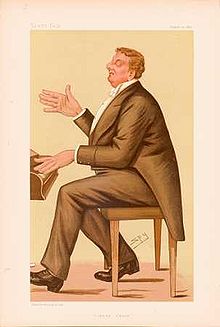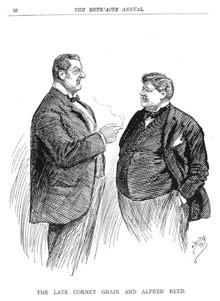- Richard Corney Grain
-
 Richard Corney Grain as depicted by 'Spy' in Vanity Fair in 1885
Richard Corney Grain as depicted by 'Spy' in Vanity Fair in 1885
 Corney Grain (left) and Alfred German Reed (right) portrayed in Entr'acte in 1895, the year they both died
Corney Grain (left) and Alfred German Reed (right) portrayed in Entr'acte in 1895, the year they both died
Richard Corney Grain (26 October 1844 - 16 March 1895), known by his stage name Corney Grain, was an entertainer and songwriter of the late Victorian era.
Contents
Biography
Born at Teversham in Cambridgeshire, Grain was the youngest son of John Grain, a farmer, and his wife, Mary Anne. His sister, Harriet Ann, was the mother of the barrister and judge Sir Travers Humphreys. Grain received what he referred to as "an average middle-class education". In 1858, at the age of 14, he attended school in Germany.[1] Returning to Britain with an interest in the Law, he enrolled as a student of the Inner Temple on 27 April 1863, and was called to the Bar on 30 April 1866.[2] For a while he practised law on the Western Circuit. However, he had theatrical leanings, and sang and acted in private.
Career
Deciding to give up a legal career and try his hand on the stage,[3] on 16 May 1870 Grain joined what was known as the German Reed Entertainments, at the Gallery of Illustration, appearing in a sketch of his own called The School-Feast.[4] At the same time, Grain entertained privately, performing his comic musical sketches at the piano for fashionable parties and other venues.[4]
Grain remained with the German Reeds until the end of his life and, after the death of another German Reed stalwart, John Orlando Parry, Grain became the company's principal comedian and sketch artist. He moved with the company to St George's Hall, toured with it in the provinces, and in 1877, after the retirement of Priscilla German Reed, became the partner of the German Reeds' son, Alfred German Reed (1847-1895), who shared the management of the company with his mother from 1871.[5] Over twenty-five years, Grain wrote between fifty and sixty entertainments for the company, consisting of social sketches and songs with piano accompaniment. His songs included "The Masher King of Piccadilly". His private performances of comic sketches also remained fashionable throughout his career. His last sketch was Music à la mode.[4]
Grain was a large man with exceptionally large and expressive hands. On occasion he took part in comediettas or other dramatic performances, but he claimed that he did not enjoy acting and was not very good at it.[1] W. S. Gilbert disagreed, asking him to perform in his absurdist comedy with the German Reeds, Happy Arcadia, as "the handsomest man in the world", because of Grain's comical appearance. Similarly in Gilbert's A Sensation Novel, he played the "spirit of romance".[6] He also played in Gilbert's Our Island Home, Ages Ago and Eyes and No Eyes (amusingly, as Pierrot). Grain was a great friend and rival of Gilbert and Sullivan performer and fellow sketch-artist, George Grossmith.
His autobiography, Corney Grain, by Himself, first appeared in Murray's Magazine and was later issued as a book in 1888. He died of "epidemic influenza" on 16 March 1895, at his home in Marylebone, London. His death, six days after that of Alfred German Reed, ended the German Reed Entertainments, which had been popular for forty years.[7]
Notes
- ^ a b Corney Grain, Richard. Corney Grain, by Himself, John Murray, London. (1888)
- ^ Foster, J. Men-at-the-bar: a biographical hand-list of the members of the various inns of court, 2nd edn (1885)
- ^ Brown, James D. British Musical Biography, Read Books (2007), p. 170 ISBN 1-4067-5614-8
- ^ a b c Watson, M. "Alfred German Reed and Corney Grain", The Theatre, 4th series, No. 25 (1895), 221–23
- ^ Dictionary of National Biography, Elibron Classics, Vol. XLVII p. 396
- ^ Walters, p. 16
- ^ St George's Hall, Langham Place, Regent Street, London", at the ArthurLloyd theatres website
References
- Williamson, David, ed. (1895). The German Reeds and Corney Grain; records and reminiscences. London: A.D. Innes.
- Walters, Michael "A Brief Overview of the Life of Rutland Barrington" in The Gilbert & Sullivan News, vol. II, no. 13, pp. 16-21 (Autumn/Winter 1998; The Gilbert and Sullivan Society).
External links
Categories:- 1844 births
- 1895 deaths
- English entertainers
- English stage actors
- People associated with Gilbert and Sullivan
- English composers
- English male singers
- English humorists
Wikimedia Foundation. 2010.
